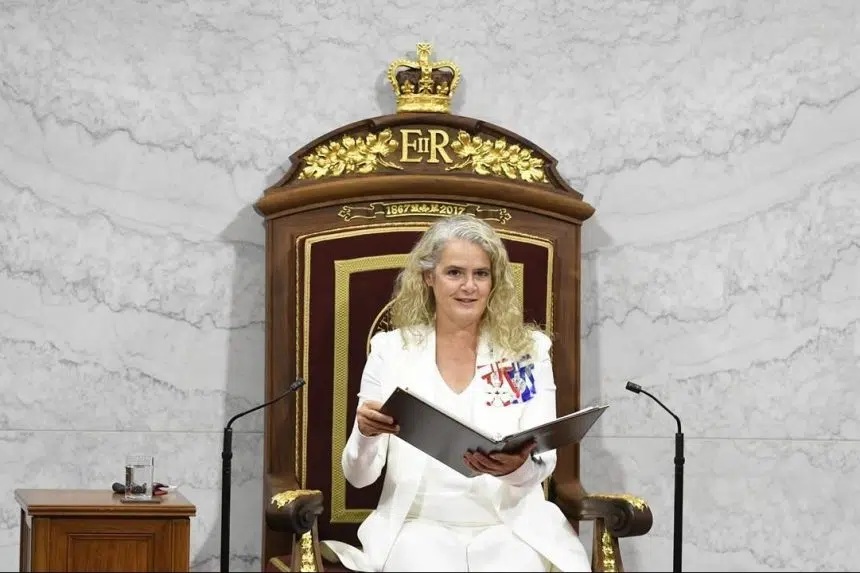OTTAWA — Julie Payette resigned as Canada’s Governor General on Thursday, saying that to protect the integrity of her office and for the good of the country, it was time for her to go.
Clouds of controversy have hung over Payette since she took over the post in 2017 but a storm was poised to break out with the imminent release of the results of an investigation into allegations of a toxic workplace at Rideau Hall.
Payette apologized for the tensions at Rideau Hall in the last several months, but in a statement announcing her historic resignation — a first for a Governor General — she also suggested she disagreed with the characterizations of her leadership.
“We all experience things differently, but we should always strive to do better, and be attentive to one another’s perceptions,” she said.
“I am a strong believer in the principles of natural justice, due process and the rule of law, and that these principles apply to all equally. Notwithstanding, in respect for the integrity of my viceregal office and for the good of our country and of our democratic institutions, I have come to the conclusion that a new Governor General should be appointed,” she continued. “Canadians deserve stability in these uncertain times.”
She also suggested the move was made for personal reasons, citing her father’s declining health.
“So it is with sureness and humility, but also with pride over what was accomplished during my tenure as Governor General and in my service to the country for the past 28 years, that I have submitted my resignation,” she wrote.
In a terse statement, Prime Minister Justin Trudeau acknowledged he had received her resignation.
“Every employee in the Government of Canada has the right to work in a safe and healthy environment, and we will always take this very seriously,” he said.
“Today’s announcement provides an opportunity for new leadership at Rideau Hall to address the workplace concerns raised by employees during the review.”
Trudeau had previously defended Payette, even as the Privy Council Office hired a third-party investigator to examine allegations of workplace harassment in the office of the Office of the Secretary to the Governor General.
That came after CBC reports alleged that Payette belittled and publicly humiliated employees, reducing some to tears and prompting some to quit.
Payette had welcomed the review at the time, saying she was deeply concerned about the allegations.
Payette, a former astronaut, was named to the position in 2017.
Her predecessor, David Johnston, had been selected by the previous Conservative government using an ad hoc committee that was later turned into an official panel on viceregal appointments.
But upon forming government in 2015, Trudeau abandoned that approach and moved the selection process inside his office.
Payette’s appointment was controversial from the outset.
Shortly after she took the job, it emerged that she’d been charged with second-degree assault while living in Maryland in 2011.
She called the charged unfounded, and it has since been expunged.
But as details of that incident emerged, so did revelations that she was involved in a fatal hit-and-run accident that same year. The case was closed without charges after a police investigation.
Both incidents raised immediate questions about how thoroughly she had been vetted for the job, and accusations she wasn’t the right fit for it have dogged her ever since.
She did not move into the official residence of Rideau Hall when she took the job, and nearly two years in, still wasn’t living there, citing privacy concerns linked to ongoing renovations.
The cost of those renovations became one of several issues that dogged her, as questions were raised about whether they were necessary or being done out of preference and at too high a cost to the taxpayer.
Instead, Payette based herself in her home province of Quebec, where she has also spent a great deal of time during the COVID-19 pandemic.
As reports of how she was allegedly treating her staff emerged, Trudeau expressed his confidence in her abilities, dismissing the idea of replacing her.
During an interview on RED FM’s The Harjinder Thind Show in Vancouver in September he said she was excellent.
“I think on top of the COVID crisis, nobody’s looking at any constitutional crises,” he said.
In the event a Governor General can’t carry out the job, is removed, or dies, the chief justice of the Supreme Court of Canada assumes the office’s powers as long as necessary.
“A recommendation on a replacement will be provided to Her Majesty Queen Elizabeth II and announced in due course, ” Trudeau said.
While the Governor General is a largely symbolic position, it does have some constitutional importance, particularly during a minority government such as the one Canada has now.
In 2008, former prime minister Stephen Harper asked then-governor general Michaëlle Jean to prorogue Parliament to avoid a non-confidence vote he was expected to lose — a decision that was controversial at the time but in keeping with constitutional tradition.
Stephanie Levitz, The Canadian Press







